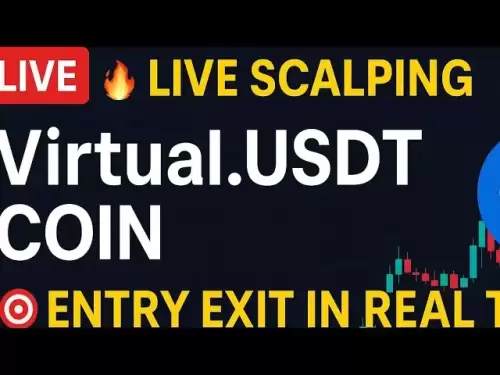-
 Bitcoin
Bitcoin $118,209.3536
1.16% -
 Ethereum
Ethereum $3,151.7546
5.98% -
 XRP
XRP $2.9277
2.35% -
 Tether USDt
Tether USDt $1.0000
0.00% -
 BNB
BNB $689.7099
1.26% -
 Solana
Solana $163.4270
1.91% -
 USDC
USDC $1.0000
0.02% -
 Dogecoin
Dogecoin $0.1983
3.74% -
 TRON
TRON $0.3008
0.51% -
 Cardano
Cardano $0.7435
2.86% -
 Hyperliquid
Hyperliquid $47.6547
-0.48% -
 Stellar
Stellar $0.4625
2.79% -
 Sui
Sui $3.9921
2.71% -
 Chainlink
Chainlink $16.0608
4.23% -
 Hedera
Hedera $0.2348
1.56% -
 Bitcoin Cash
Bitcoin Cash $496.6985
1.25% -
 Avalanche
Avalanche $21.9038
5.41% -
 UNUS SED LEO
UNUS SED LEO $8.8356
-1.88% -
 Shiba Inu
Shiba Inu $0.0...01364
5.31% -
 Toncoin
Toncoin $3.1102
4.35% -
 Litecoin
Litecoin $95.9756
3.59% -
 Polkadot
Polkadot $4.0925
5.78% -
 Monero
Monero $333.7622
-1.44% -
 Uniswap
Uniswap $9.1968
2.25% -
 Bitget Token
Bitget Token $4.6378
6.23% -
 Pepe
Pepe $0.0...01282
6.77% -
 Dai
Dai $1.0002
0.03% -
 Ethena USDe
Ethena USDe $1.0005
0.00% -
 Aave
Aave $329.9143
4.49% -
 Bittensor
Bittensor $441.4995
6.89%
Triple WMA trading strategy for Ethereum
The Triple WMA strategy uses three weighted moving averages to identify Ethereum trend reversals and improve trade timing.
Jul 15, 2025 at 03:42 am
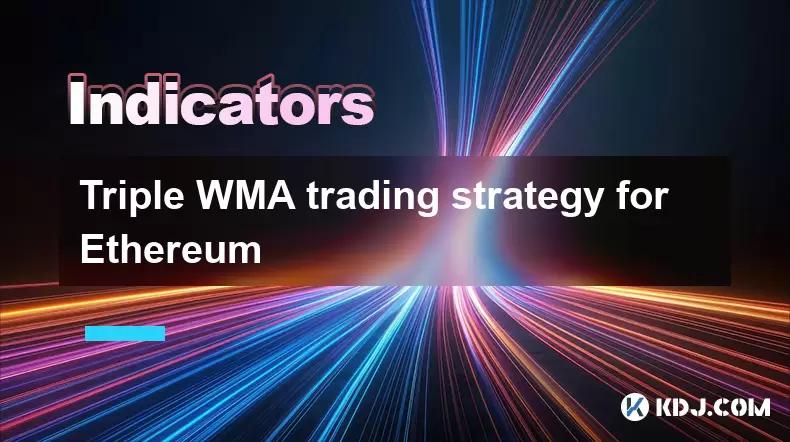
Understanding the Triple WMA Trading Strategy
The Triple Weighted Moving Average (WMA) trading strategy is a technical analysis method used by traders to identify potential trend reversals and entry points in cryptocurrency markets. Ethereum, being one of the most volatile and actively traded digital assets, is particularly suitable for this strategy due to its frequent price swings.
WMA, unlike Simple Moving Average (SMA) or Exponential Moving Average (EMA), places more emphasis on recent price data. By combining three different WMA lines — typically short-term, medium-term, and long-term — traders can gain deeper insights into market momentum and direction.
Setting Up the Triple WMA Indicator
To implement the Triple WMA strategy, you’ll need to configure your charting platform with three distinct WMA periods. A commonly used setup includes:
- WMA 5: Short-term indicator
- WMA 10: Medium-term indicator
- WMA 20: Long-term trend filter
Most platforms like TradingView or MetaTrader allow users to customize indicators. Here’s how to set it up:
- Open your preferred charting tool
- Locate the indicator section
- Search for "Weighted Moving Average"
- Add three separate WMAs with the chosen periods
- Customize colors for easy visual distinction (e.g., red for WMA 5, yellow for WMA 10, blue for WMA 20)
Once all three are applied, the next step involves interpreting crossovers and divergences between these lines.
Identifying Buy Signals Using Triple WMA
A buy signal in the Triple WMA strategy occurs when the shortest WMA crosses above the two longer ones, signaling an uptrend. Specifically:
- The WMA 5 crosses above both WMA 10 and WMA 20
- All three WMAs begin to align upwards
- Price action should be above all three moving averages
For example, during a bullish phase in Ethereum's price, if the WMA 5 line rises above WMA 10, followed by WMA 10 rising above WMA 20, this indicates a strong buy opportunity. Traders often wait for a candle close above these levels before entering a position to confirm the trend.
Additionally, volume surges accompanying such crossovers increase the probability of a successful trade.
Recognizing Sell Signals with Triple WMA
Conversely, a sell signal appears when the shortest WMA dips below the other two, suggesting a bearish shift. Key conditions include:
- WMA 5 drops below WMA 10 and WMA 20
- The three WMAs start to slope downward
- Price moves below all three moving averages
In the context of Ethereum, which experiences sharp corrections, this configuration helps traders exit positions before major downside movements. For instance, if after a rally, Ethereum’s price begins to fall below WMA 5, and WMA 5 subsequently closes below WMA 10, this signals a reversal.
It’s crucial to use stop-loss orders just above the nearest resistance level to protect against false breakouts.
Backtesting the Triple WMA Strategy on Ethereum
Before applying the Triple WMA strategy in live trading, backtesting is essential. Historical performance on Ethereum charts shows that this method works well in trending environments but may produce false signals during sideways or choppy markets.
Here’s how to backtest effectively:
- Choose a historical time frame (e.g., 2021–2023 Ethereum price data)
- Apply the Triple WMA settings
- Manually simulate trades based on crossover rules
- Record win/loss ratios and average returns per trade
Using tools like TradingView’s Strategy Tester, you can automate this process. It allows you to input your strategy logic and run simulations across thousands of candles.
During testing, pay attention to how often the strategy generates signals and whether those signals lead to profitable outcomes. Adjust WMA lengths if necessary to optimize performance for Ethereum’s volatility.
Combining Triple WMA with Other Indicators
While the Triple WMA strategy is effective on its own, pairing it with complementary tools enhances accuracy. Popular combinations include:
- Relative Strength Index (RSI): Helps identify overbought (>70) or oversold (<30) conditions
- Volume Profile: Confirms strength behind price movements
- MACD: Provides additional confirmation of trend changes
For example, if the Triple WMA gives a buy signal, but RSI is already in overbought territory, it might be wise to wait for a pullback before entering. Similarly, a sell signal supported by high volume and negative MACD divergence increases reliability.
These integrations help filter out noise and improve risk-reward ratios in Ethereum trading.
Frequently Asked Questions
Q1: Can the Triple WMA strategy be used on lower timeframes for Ethereum scalping?
Yes, the Triple WMA strategy can be adapted for shorter timeframes like 15-minute or 5-minute charts. However, due to increased volatility in Ethereum, false signals are more common on lower timeframes. Traders should combine this with volume filters or order flow analysis to improve accuracy.
Q2: What are the optimal WMA periods for Ethereum day trading?
While WMA 5, 10, and 20 are standard, some traders prefer WMA 9, 21, and 50 for smoother signals. There’s no universally best setting; it depends on individual trading style and market conditions. Testing various combinations through backtesting is recommended.
Q3: How does the Triple WMA compare to Triple EMA strategies in Ethereum trading?
The Triple WMA reacts faster to price changes than Triple EMA because WMA applies more weight to recent prices. This makes WMA better suited for catching early trend reversals in fast-moving assets like Ethereum. However, it also increases sensitivity to noise and whipsaws.
Q4: Is the Triple WMA strategy suitable for Ethereum futures trading?
Absolutely. The Triple WMA strategy works well in leveraged Ethereum futures markets. Due to higher volatility and extended trading hours, futures traders often rely on this strategy to manage entries and exits. Proper risk management is critical due to amplified exposure.
Disclaimer:info@kdj.com
The information provided is not trading advice. kdj.com does not assume any responsibility for any investments made based on the information provided in this article. Cryptocurrencies are highly volatile and it is highly recommended that you invest with caution after thorough research!
If you believe that the content used on this website infringes your copyright, please contact us immediately (info@kdj.com) and we will delete it promptly.
- Eclipse Airdrop and Token Supply: Navigating the Crypto Landscape
- 2025-07-16 18:50:13
- Solana Price, Zebec Network, and Remittix: Decoding the Crypto Signals
- 2025-07-16 18:30:13
- Crypto Picks & Altcoin Breakout: August's Hottest Trends
- 2025-07-16 18:30:13
- XLM Stellar Analyst Prediction: Is a $10 Target on the Horizon?
- 2025-07-16 19:10:12
- Dubai, Ripple, and Tokenization: A New Era for Real Estate
- 2025-07-16 18:50:13
- Unilabs Finance (UNIL): Primed for a Massive 2025 Launch?
- 2025-07-16 19:15:12
Related knowledge
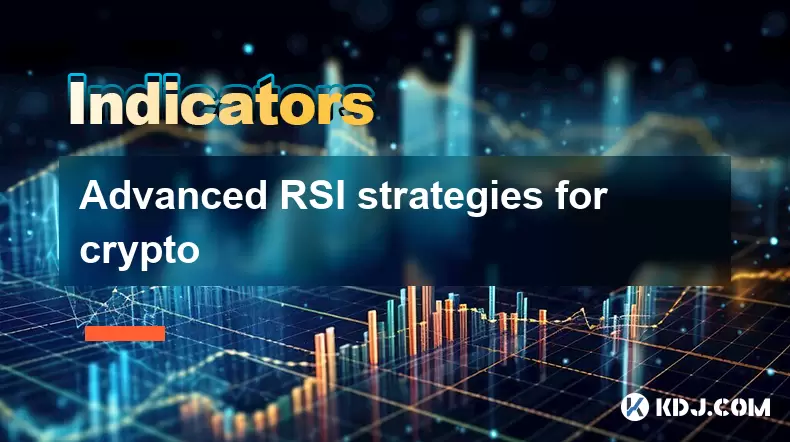
Advanced RSI strategies for crypto
Jul 13,2025 at 11:01am
Understanding the Basics of RSI in Cryptocurrency TradingThe Relative Strength Index (RSI) is a momentum oscillator used to measure the speed and chan...
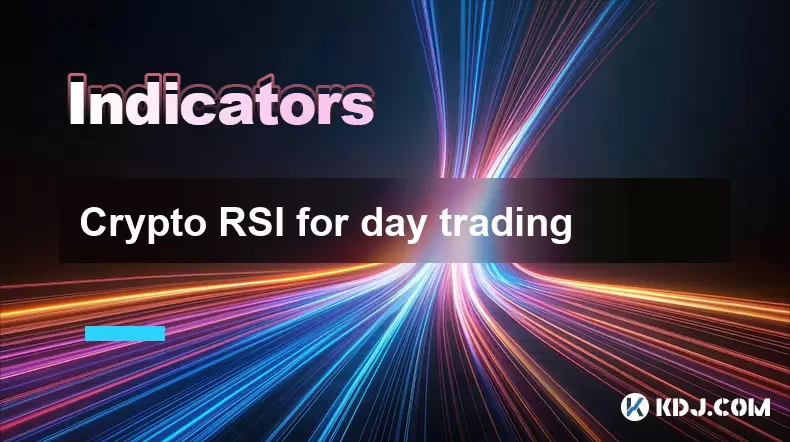
Crypto RSI for day trading
Jul 12,2025 at 11:14am
Understanding RSI in the Context of Cryptocurrency TradingThe Relative Strength Index (RSI) is a momentum oscillator used to measure the speed and cha...
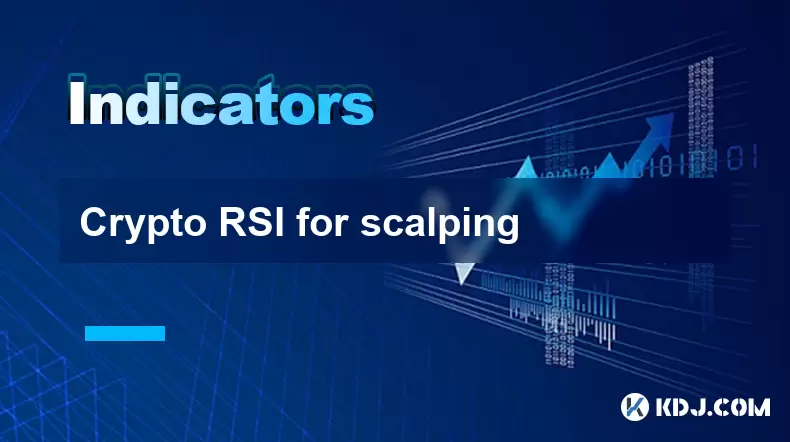
Crypto RSI for scalping
Jul 12,2025 at 11:00pm
Understanding RSI in the Context of Crypto TradingThe Relative Strength Index (RSI) is a momentum oscillator widely used by traders to measure the spe...
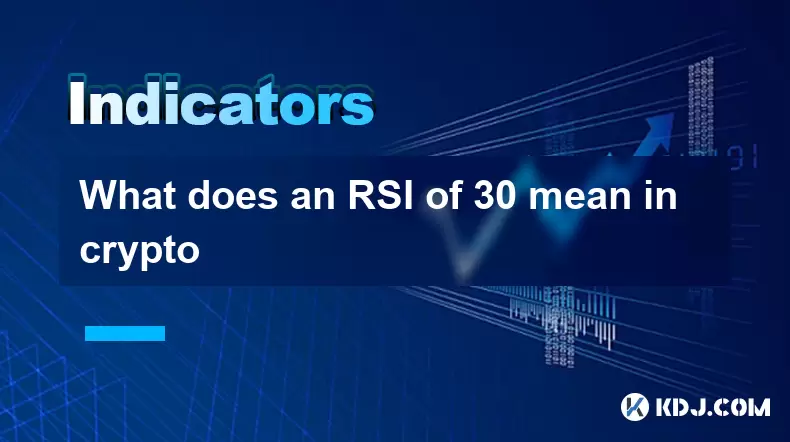
What does an RSI of 30 mean in crypto
Jul 15,2025 at 07:07pm
Understanding RSI in Cryptocurrency TradingRelative Strength Index (RSI) is a momentum oscillator widely used in cryptocurrency trading to measure the...
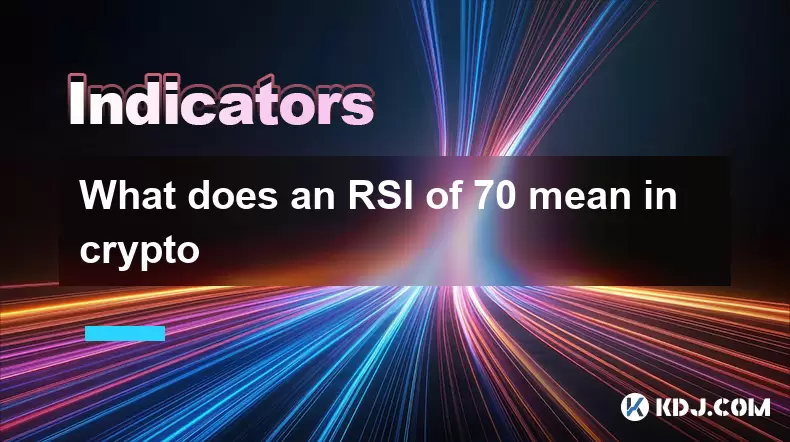
What does an RSI of 70 mean in crypto
Jul 13,2025 at 06:07pm
Understanding the RSI Indicator in Cryptocurrency TradingThe Relative Strength Index (RSI) is a widely used technical analysis tool that helps traders...
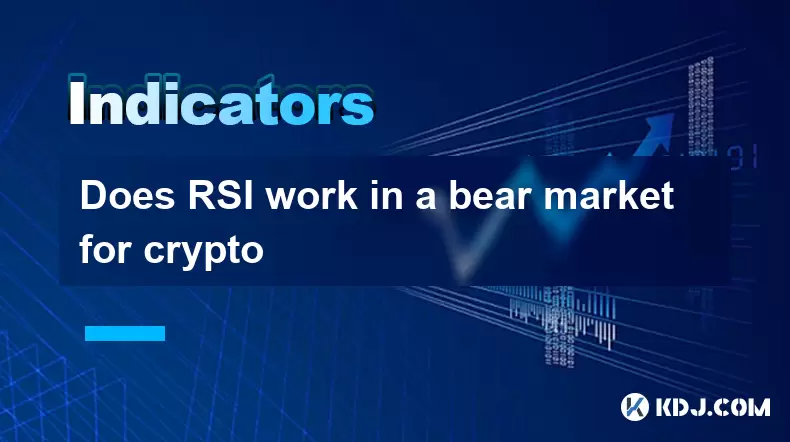
Does RSI work in a bear market for crypto
Jul 16,2025 at 01:36pm
Understanding RSI in Cryptocurrency TradingThe Relative Strength Index (RSI) is a momentum oscillator used by traders to measure the speed and change ...

Advanced RSI strategies for crypto
Jul 13,2025 at 11:01am
Understanding the Basics of RSI in Cryptocurrency TradingThe Relative Strength Index (RSI) is a momentum oscillator used to measure the speed and chan...

Crypto RSI for day trading
Jul 12,2025 at 11:14am
Understanding RSI in the Context of Cryptocurrency TradingThe Relative Strength Index (RSI) is a momentum oscillator used to measure the speed and cha...

Crypto RSI for scalping
Jul 12,2025 at 11:00pm
Understanding RSI in the Context of Crypto TradingThe Relative Strength Index (RSI) is a momentum oscillator widely used by traders to measure the spe...

What does an RSI of 30 mean in crypto
Jul 15,2025 at 07:07pm
Understanding RSI in Cryptocurrency TradingRelative Strength Index (RSI) is a momentum oscillator widely used in cryptocurrency trading to measure the...

What does an RSI of 70 mean in crypto
Jul 13,2025 at 06:07pm
Understanding the RSI Indicator in Cryptocurrency TradingThe Relative Strength Index (RSI) is a widely used technical analysis tool that helps traders...

Does RSI work in a bear market for crypto
Jul 16,2025 at 01:36pm
Understanding RSI in Cryptocurrency TradingThe Relative Strength Index (RSI) is a momentum oscillator used by traders to measure the speed and change ...
See all articles























